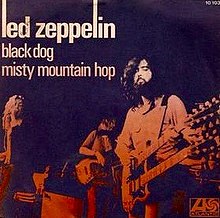Black Dog (song)
| "Black Dog" | ||||||||||
|---|---|---|---|---|---|---|---|---|---|---|

French single picture sleeve
|
||||||||||
| Single by Led Zeppelin | ||||||||||
| from the album Led Zeppelin IV | ||||||||||
| B-side | "Misty Mountain Hop" | |||||||||
| Released | 2 December 1971 (US) | |||||||||
| Format | 7-inch 45 rpm | |||||||||
| Recorded | Headley Grange, Headley, England, 1971 | |||||||||
| Genre | ||||||||||
| Length | 4:55 | |||||||||
| Label | Atlantic | |||||||||
| Writer(s) | ||||||||||
| Producer(s) | Jimmy Page | |||||||||
| ISWC | T-070.014.416-6 | |||||||||
| Led Zeppelin singles chronology | ||||||||||
|
||||||||||
"Black Dog" is a song by English rock band Led Zeppelin, the opening track on their fourth album (1971). It was released as a single in the US and in Australia with "Misty Mountain Hop" as the B-side, reaching number 15 on the Billboard Hot 100 and number 10 in Australia.
In 2004, the song was first ranked #294 on Rolling Stone's list of the 500 Greatest Songs of All Time before being ranked at #300 in 2010. Music sociologist Deena Weinstein calls "Black Dog" "one of the most instantly recognisable [Led] Zeppelin tracks".
The song's title is a reference to a nameless, black Labrador Retriever that wandered around the Headley Grange studios during recording. The retriever, despite his advanced age, was still sexually adventurous, like the song's protagonist who reiterates his desperate desire for a woman's love and the happiness it provides. As Plant explained to a 1972 concert audience:
Let me tell you 'bout this poor old dog because he was a retriever in his early days, and the only thing he could ever find in his late days was his old lady who lived two houses away from where we were recording. And he used to go see the old lady quite regularly, but after he'd "boogied" and everything else he couldn't get back. And we used to carry him back.
The lyric "Eyes that shine burning red" is also reminiscent of the Black dog legend.
Plant's vocals were recorded in two takes.
John Paul Jones, who is credited with writing the main riff, wanted to write a song with a winding riff and complex rhythm changes that people could not "groove" or dance to.
In an interview, he explained the difficulties experienced by the band in writing the song:
...
Wikipedia
